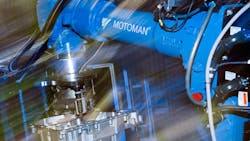STEM Education is Critical to a Vibrant Manufacturing Future
On behalf of Yaskawa Motoman, Roger Christian, the divisional leader of New Business Development for the Dayton, Ohio-based robotics company, shares an optimistic view of U.S. manufacturing's future.
Q: Why do you believe manufacturing is critical to the United States.
A: Manufacturing helped to build this country, and by having that strong base, we will strengthen our middle class and ensure that we continue making a significant portion of our hard goods in the U.S.A.
With a thriving manufacturing sector, we also have the ability to support the needs of our military. Simply put, we can sustain our global leadership position with a strong manufacturing base.
Q: What has your company done and what will it continue to do to help change the perception of manufacturing careers.
A: Today, many students leave high school or college unprepared for career success in high-demand fields like advanced manufacturing and robotics, even while the industry faces a severe shortage of skilled workers. Despite this clear need, both schools and manufacturers often face daunting challenges in attempting to implement effective STEM education, career pathways and training programs.
We believe that successful workforce development and sustainable economic growth depend on close alignment of STEM education, certification and training with the needs and expertise of industry leaders.
Yaskawa Motoman is addressing this need by providing a comprehensive industrial workforce development education model for schools, which includes skill-based curricula, student-centric STEM robotic equipment, programming and virtualization software tools, and certification/credentialing programs to deliver real-world industrial experiences in a classroom environment.
Every year, Yaskawa Motoman invites hundreds of students, parents and educators to tour our facility and speak with our automation professionals about future job opportunities. Students also have the opportunity to see live robotics demonstrations. The purpose is to recognize robotics as a key technology for our nation’s economy and to foster interest in the STEM disciplines among students.
On a daily basis, we are partnering with school districts, career techs, community colleges and four-year universities, as well as various federal, state and regional educational/industrial workforce organizations to close the manufacturing skill gap. Together with the educator community, industrial partners and best-in-class manufacturing technology companies, we are creating new and better workforce models and STEM educational opportunities to support job creation, advance scientific discovery, enhance manufacturing capabilities and drive economic growth throughout the United States.
Q: What new disruptions do you see roiling manufacturers' best laid plans?
A: Over the past five decades, America has outsourced entire industries (e.g., batteries, textiles, toys and consumer electronics) to access cheaper labor, rather than investing in automation to lower product costs. If our industries suddenly decided to re-shore their manufacturing, we’d have a difficult time domestically sourcing the skilled labor and engineering know-how.
In other words, we forgot how to make these products.
The most disruptive condition that can threaten our current domestic manufacturing base is other emerging world countries automating the manufacturing of those products before we do.
Q: What new technologies, product strategies or best practices will transform how work gets done? We're especially looking for how you think the Internet of Things will continue to transform manufacturing businesses.
A: All of the building blocks are available today: robotics, connectivity tools (IIoT), additive manufacturing, simulation and OLP. Properly integrated and implemented, there is no country on this planet that could compete with America’s manufacturing innovation and productivity.
To achieve this, though, industry, educators and government need to work together. Educators need to invite industry to collaborate on curriculum development, and government at all levels can help with a commitment and investment for this and other initiatives.
Q: What industries will grow or slow?
A: High-growth industries will include companies providing factory automation, robotics, IIoTconnectivity tools, additive manufacturing (3D printing), online retailing, military suppliers, facility support services, health care providers and other service-related industries.
Declining industries include companies in printed media, textiles, computer and peripheral manufacturing, leather products and apparel manufacturing. This can change if America is committed to re-building its manufacturing base. The tools to do so are available, but a commitment to long-term investment is needed.
Roger Christian, divisional leader of New Business Development for Dayton, Ohio-based Yaskawa Motoman.
